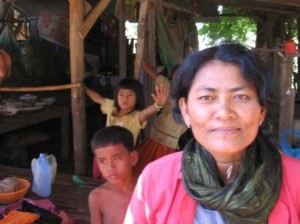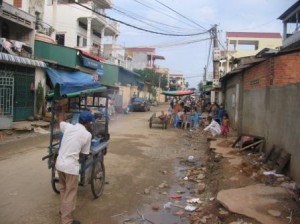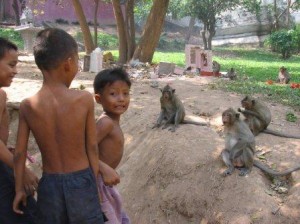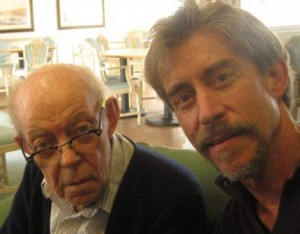Tuesday
Featured StoriesK.O.S. Energy
 Bill Scheffel reflects on the Shambhala teachings of Chogyam Trungpa (whom Bill refers to throughout the article as “Lord Mukpo”, his family name and the name he often used when teaching Shambhala Training). This essay was inspired by extended periods of time Bill spent in Cambodia between 2004 and 2007. It is part contemplation, part travel writing, and also an homage to the people and land of Cambodia.
Bill Scheffel reflects on the Shambhala teachings of Chogyam Trungpa (whom Bill refers to throughout the article as “Lord Mukpo”, his family name and the name he often used when teaching Shambhala Training). This essay was inspired by extended periods of time Bill spent in Cambodia between 2004 and 2007. It is part contemplation, part travel writing, and also an homage to the people and land of Cambodia.
Originally published on Radio Free Shambhala, the Shambhala Times will be featuring it in three parts. All photos are courtesy of Bill Scheffel.
The Kingdom of Shambhala refers to a semi-mythical society that once existed in the Himalaya region of central Asia, an “enlightened society” that was based and organized on the principle of awake – that society could encourage and support the spiritual realization of every individual within it. Not that everyone was or would become enlightened or that the society was perfect, but that it’s constitution, so to speak, held this aim.
In the last decade of his life, Lord Mukpo sought to establish “The Kingdom of Shambhala” in Nova Scotia, Canada. This kingdom was often referred to simply as “K.O.S.” Lord Mukpo encouraged those students who could, to move there, which he eventually did himself, shortly before he died. This northerly, maritime province, agriculturally based with a long winter, and all too brief summer and a fairly depressed and less globalized economy was hardly a destination of choice for his largely American students.
The aims of this contemporary K.O.S. were to found a spiritually based but also spiritually inclusive society, one that would be a seat or home for the Vajrayana Buddhist tradition, but founded on “Shambhala” principles which would make it a potential home for other spiritual traditions as well. Lord Mukpo’s keen enthusiasm for meeting, respecting, understanding and supporting the “contemplative” heart of all human spirituality was demonstrated in every aspect of his life trajectory, in his friendship with, say, Tomas Merton (and the many other contemplative Christians he had the opportunity to meet especially during his time in England) and his founding of Naropa University. In Nova Scotia, Lord Mukpo would be delighted to imagine Christian and Buddhist monasteries side-by-side, as well as Shinto shrines and, no doubt, mosques and centers of Islamic study.
K.O.S. as blueprint or reality has an urgent imperative. Global materialism threatens not only our environment and the countless species we share the earth with, but it threatens our human lineages of spirituality and culture. The erosion and outright destruction of so many traditional cultural containers and ways of life makes conservation of our spiritual traditions a real and urgent necessity. Tibetan Buddhism is one obvious example. Countless native or indigenous communities – each with their own unique and uniquely beautiful spiritual expression – are already lost forever. In Lord Mukpo’s vision, K.O.S. was intended to be a safe, fertile and welcoming ground for preserving our spiritual traditions.
 Lord Mukpo also spoke fervently about our relationship to environment and how people would need to live in Nova Scotia. So much so, that K.O.S might be considered as much an ecology as a society. The “setting sun world” – as he called it – is based on consumerism, its chimera, its endless seeking of entertainment, of distraction. A necessary underpinning of consumerism, is convenience, where every effort is made to make life merely comfortable and easy. He called this “warding off death”, a methodology of a thousand invented needs. Attenuated as consumerism-convenience have become, we exist in a vortex of speed, fundamentally aggressive and thoughtless. It is a literal disconnect from the earth.
Lord Mukpo also spoke fervently about our relationship to environment and how people would need to live in Nova Scotia. So much so, that K.O.S might be considered as much an ecology as a society. The “setting sun world” – as he called it – is based on consumerism, its chimera, its endless seeking of entertainment, of distraction. A necessary underpinning of consumerism, is convenience, where every effort is made to make life merely comfortable and easy. He called this “warding off death”, a methodology of a thousand invented needs. Attenuated as consumerism-convenience have become, we exist in a vortex of speed, fundamentally aggressive and thoughtless. It is a literal disconnect from the earth.
Life in Nova Scotia, he told us, could not be this way. “As far as KOS goes,” he taught, “we all have to work on the earth, literally and properly.”
Since medieval times, the process of conquering the world has been based on conquering the earth instead of touching ground, touching soil properly. And the latest stage is designed to avoid altogether any possibilities of touching the earth. We are no longer allowed to drink raw milk or eat raw meat… You might think we are about to create a genteel world of people who never have to watch blood bleeding or experience a genuine, bad nightmare. That is wrong, ladies and gentlemen. These principles are not particularly geared so that we could avoid earth. Without earth we cannot have heaven, and then we can’t have our kingdom at all… Luxury is experiencing reality, ladies and gentlemen.
. . . . .
 I never was able to move to Nova Scotia, or even spend much time there (curiously, my grandparents on my mother’s side are from Nova Scotia and Prince Edward Island). In spite of being part of the K.O.S. vision or idea from its inception, and my deep identification with it, perhaps I took, or was led to, a route elsewhere – but with a similar destination, or at least the glimpse of a similar vision. Between 2005 and 2007, I took five trips to Cambodia, staying there for two to five months at a time. Much to my surprise, I discovered the Kingdom of Shambhala in Cambodia. If not an entire kingdom, something, at least for me, of its flavor, intent and latency – something I called “K.O.S energy.”
I never was able to move to Nova Scotia, or even spend much time there (curiously, my grandparents on my mother’s side are from Nova Scotia and Prince Edward Island). In spite of being part of the K.O.S. vision or idea from its inception, and my deep identification with it, perhaps I took, or was led to, a route elsewhere – but with a similar destination, or at least the glimpse of a similar vision. Between 2005 and 2007, I took five trips to Cambodia, staying there for two to five months at a time. Much to my surprise, I discovered the Kingdom of Shambhala in Cambodia. If not an entire kingdom, something, at least for me, of its flavor, intent and latency – something I called “K.O.S energy.”
For virtually each of the more than four-hundred and twenty days I spent in Cambodia I was on “retreat”, in that my day was centered around meditation practice, but also writing. So it was a meditation-artist’s retreat. Or, I could say, I was the experiment of my meditation and art. We become the experiment or our spiritual practice, with no guarantee it will turn out successfully, though perhaps the more willing the surrender of our ingredients the more likely the experiment will succeed. I saw myself as an “experiment” of the drala principle and both meditation and writing were essential in the laboratory.
I began each day with a long session of meditation followed by writing (typically I would meditate at the end of the day as well). I would practice in my guest house room, leaving it to take breakfast and lunch at simple street-side restaurants. Only by mid-afternoon would I be ready to take up my other practice, “aimless wandering” which took the form of long walks through Phnom Penh (or the other towns and cities I stayed in). As foreigner, stranger and other these walks remained as pristine, remarkable and informative as, say, walking through an old-growth redwood forest or the Galapagos Islands might be. Every encounter was unexpected and all my learning was anecdotal and immediate (for I had no guides, no companions and read no books).
The politics and forces of the setting sun have produced a terrible pair of pliers: at one end exploitation and the poverty most of the worlds populations lives under; on the other, the ever heightening madness of the first world, speeding, driven by amusements and alienation. The living-standard gap between us is grotesque, but both ends of the pliers inflict pain. And there is a kind of well-being we in the first-world are increasingly loosing that still exists in a country like Cambodia. In the grinding poverty there are priceless riches, even “the luxury of experiencing reality” as Lord Mukpo put it. One day, in a curbside restaurant I found an ingenious and curious example of simplicity, one I wrote about in my journal:
I adore the squat toilet, even as I’ve come to understand it. A hole in the floor and beside it water stored in a plastic bucket or pot, some kind of reservoir. And each reservoir has a ladle or bucket inside it. To scoop up the water and pour it down the hole (which is s-curved, a simple hydraulic that siphons itself) is almost a sacrament, serving water as it serves you. This restaurant has a cement reservoir next to the squat toilet. The reservoir is shared by the kitchen and divided in half by the bathroom wall. Inside it are fish, eighteen or twenty inches in length, swimming in confinement until they are ordered for lunch. Multiple needs are being met in the few cubic yards of this water-conserving intimacy.
Stay tuned for Part Two of K.O.S. Energy tomorrow!
______________________________________






May 5, 2010
Reply
“his restaurant has a cement reservoir next to the squat toilet. The reservoir is shared by the kitchen and divided in half by the bathroom wall. Inside it are fish, eighteen or twenty inches in length, swimming in confinement until they are ordered for lunch. Multiple needs are being met in the few cubic yards of this water-conserving intimacy.”
You’re saying that the person using the toilet has access to the same reservoir as the kitchen workers? That the ladle in the bathroom is being dipped into the same water the kitchen workers are putting their hands into?
This is something to be admired? I don’t get it. Sounds awful.